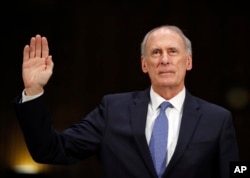President Donald Trump’s pick to lead the U.S. intelligence community cited Russia as a top threat, telling lawmakers Tuesday it is accepted fact that Moscow tried to influence November’s presidential election.
Former Indiana Senator Dan Coats told the Senate Intelligence Committee that Russia “seems to have stepped up their game” in its campaign to influence the American elections. He promised to support a thorough investigation of the Kremlin's role in the U.S. vote.
“It is something that needs to be investigated and addressed,” the 73-year-old Coats, a Republican, said during his confirmation hearing.
“I think it is publicly known and acknowledged and accepted that Russia definitely did try to influence the campaign,” Coats said. “To what extent they were successful, I don’t think we know.”
Still, Coats called Russia’s newfound assertiveness a “grave concern.”
The stance would seem to put Coats at odds with Trump, who initially dismissed the intelligence community’s findings, both during the campaign and after the election.
A report issued before Trump's inauguration by the Office of the Director of National Intelligence concluded that Russian-backed operatives hacked into email servers belonging to the Democratic National Committee in order to “undermine public faith in the U.S. democratic process.”
But the January 6 report also said Russia then went further as it “aspired to help” elect then-candidate Trump.
Since taking office, Trump has repeatedly praised Russian President Vladimir Putin, causing some lawmakers to worry the administration will decline to take a hard enough line with Moscow. Others have raised concerns about intelligence being politicized to support the president’s views.
“Our job is not to influence intelligence in any way for political reasons,” Coats assured lawmakers. “I will not tolerate anything that falls short of that standard,” he said.
Coats also promised that, if confirmed, he would make all relevant materials available for congressional investigations.
In his opening statement identifying other pressing threats to the United States, Coats included what he called “radical Islamic terrorism.”
“They’re spreading their message of fear and hate through cyberspace and mobilizing to venues beyond their self-declared caliphate,” he said in an apparent reference to the Islamic State terror group.
Coats also cited concerns about North Korea and China.
Lawmakers questioned Coats about his views on the interrogation of suspected terrorists. While in the Senate, he had been an opponent of legislation introduced in 2015 to ban so-called enhanced interrogation techniques like waterboarding, which many consider to be torture.
“I absolutely will follow the law,” Coats said.
The position of director of national intelligence was created following the September 11, 2001, terror attacks on New York’s World Trade Center and the Pentagon to improve communication and information sharing among the country's 16 intelligence agencies. Since then some lawmakers have voiced concern that the office has grown too large and cumbersome.
The Trump administration has also suggested the need to look at streamlining the processes. Coats said he was willing to consider reforms, but rejected the notion of bringing in anyone from outside the U.S. intelligence community to lead a review.






